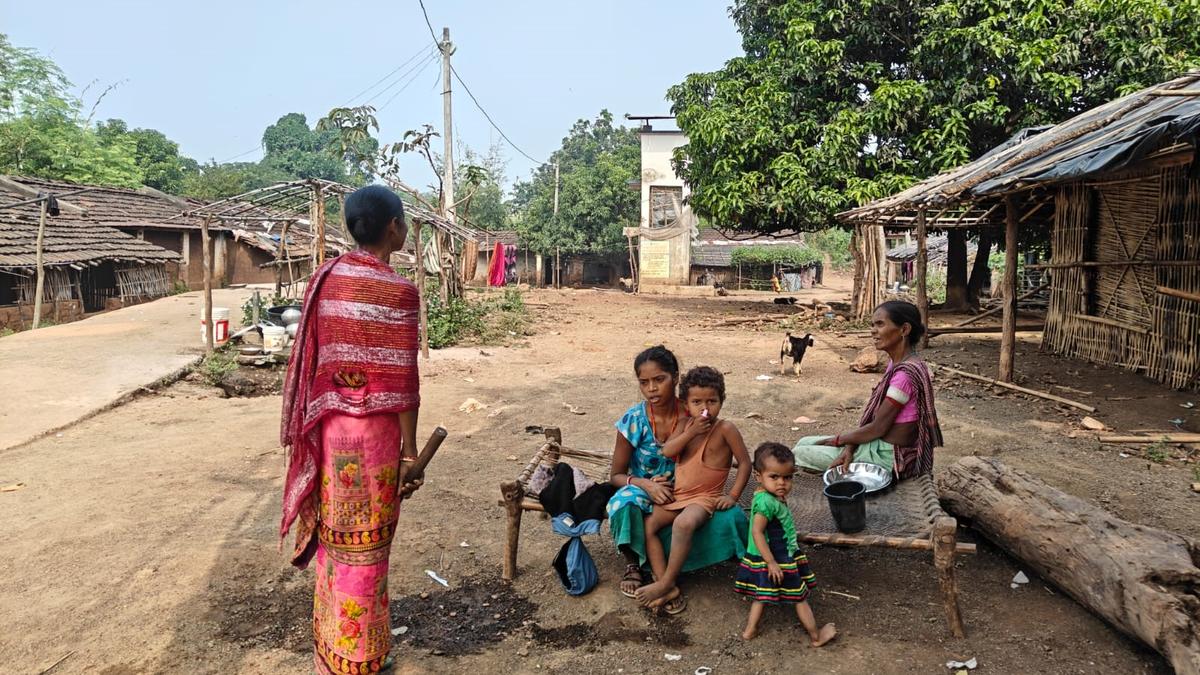From doorstep delivery of construction materials for places of worship in Adivasi villages to pamphlets highlighting key promises such as cash for women, jobs for youth, and housing for all, the Bharatiya Janata Party’s campaign in Santhal Pargana is playing out on the ground in different ways across the region’s northern-most constituencies, including Maheshpur, Rajmahal, Berhait, Pakur, and Borrio.
The Jharkhand Mukti Morcha’s (JMM) rhetoric of calling BJP’s star campaigners “outsiders”, in whose States tribal people are subjected to atrocities, too, is reaching several Adivasi-dominated villages through videos on social media. While several Adivasi communities spoke of infrastructure needs – for self and community — conversations in others featured concerns of Adivasi women marrying outside the community, consent, and changing demographics.
The Santhal Pargana division, which goes to polls on November 20, comprises six districts containing 18 Assembly constituencies. In the 2019 Assembly election, nine of these seats were won by the JMM, and four each by the BJP and Congress. In 2014, even when the BJP had formed the government, the JMM had won seven seats in the region, with the BJP also winning seven and the Congress three. Seven constituencies in the region are reserved for Scheduled Tribes and one for Scheduled Castes (Deoghar).
Some of the heavyweight candidates contesting in this region include Chief Minister Hemant Soren from Berhait (ST) seat, who faces youth leader Gameliyal Hembrom of the BJP; Lobin Hembrom, a long-time JMM loyalist contesting on a BJP ticket from Borrio (ST); and Anant Kumar Ojha, three-term MLA and incumbent from the Rajmahal seat.
Congress leader and Minister Irfan Ansari, the incumbent MLA from Jamtara, will be fighting against the BJP’s Sita Murmu Soren, Shibu Soren’s daughter-in-law, who had won from Jama (ST) on a JMM ticket in the past. In Pakur, the focus is on Minister and Congress leader Alamgir Alam’s wife, Nisat Alam, after Mr. Alam was arrested by the Enforcement Directorate in a money-laundering case this May.
Baragadih village sand dumped by BJP workers
About 15 km from Berhait town, in Baragadih village, pradhan Jarman Murmu sits on the village square – a cracked cement porch on the side of the road.
“About an hour ago, BJP candidate Gameliyal Hembrom had come seeking votes. He spoke to us about this square and the need for a Manjhithan [place of worship] as well, for our Sarna rituals. He promised us he will get it done,” Mr. Murmu said, just as a convoy of vehicles pulled into the village with BJP flags and aides of the candidate. Behind them were two trucks laden with sand. They dumped the sand near the village square and drove off.
“What will we do with the sand now? We will need cement also. They promised they will send it to us,” Mr. Murmu said.
In Borrio’s Moti Pahari panchayat area, Mr. Lobin Hembrom’s sons have been highlighting “Bangladeshi infiltration” in their campaigns, in villages such as Moti Pahari and Mirza Chowki.
The allegation of “Bangladeshi infiltration” changing the Adivasi character of Santhal Pargana has been at the centre of the BJP’s pitch in Jharkhand this election season, put together with Prime Minister Narendra Modi’s call for “Ek Hai to Safe hai” (We are safe when united). The JMM-led alliance’s counter has been that the onus is on the Centre to check this so-called “infiltration”. And as the campaign reaches its peak, the JMM has also accused the BJP of trying to change Jharkhand’s identity by calling for Santhal Pargana to be carved out of the State, referring to remarks of BJP Lok Sabha MP Nishikant Dubey in Parliament demanding that the region be declared a Union Territory.
Closer to the border between Jharkhand and West Bengal, Chandna village sits at the boundary between Pakur and Berhait Assembly constituencies.
Matal Tudu, a 40-year-old farmer from Chandna, said, “We have been seeing a lot on television about ‘outsiders’ coming in. It might not be a problem in our village, where there are only Santhal homes. It is a problem though in the nearby regions where the Adivasi population is reducing. But can we really do anything about it? We know that our MLA built this road for us and ensured all government benefits” Mr. Tudu said, as another resident, Ramesh Tudu, 34, chipped in: “It is a problem that so many of our women are marrying non-Adivasi people.”
By this time, 48-year-old panchayat worker, Saken Soren, who votes in the Maheshpur constituency, joins the conversation, “Yes, but is anybody forcing them to marry outside the community? They are doing it of their own will.” Mr. Tudu nods as if in agreement, just as Mr. Soren shows a video posted on a WhatsApp group. Its title asks Adivasi voters to “be wary of” voting for the BJP, with a group of purported “BJP workers” shouting “SC/ST murdabad” (Down with SC/ST).
As the video played out, the three men start talking about whether it was fake news, until Mr. Tudu starts talking about his friends in Borrio’s Mirza Chowki area. “Mr. Lobin Hembrom is very popular among my friends there. They have voted from him even when he left JMM and fought as an Independent.”
But in Sahibganj district’s Durga Tola, another Adivasi village, Poulus Hansda, 27, echoes the concerns of women from his community marrying into non-Adivasi families, but adds carefully that they are doing it of their own will. “And it is not as if they are marrying into one community only,” Mr. Hansda, also a farmer, said, adding, “But as far as the village is concerned, I am worried about lack of irrigation, and the stone crushing plants in Sahibganj ruining our fields.”
In nearby Tetariya, a settlement of Pahariya community, Madya Paharni, 40, said, “It is a sensitive issue, but there are many girls from our village who went outside and got married. Most married into Hindu families.
Published – November 18, 2024 04:16 am IST
